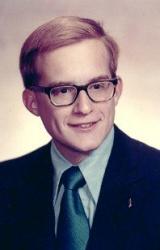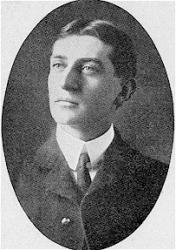Planning worship?
Check out our sister site, ZeteoSearch.org,
for 20+ additional resources related to your search.
- |
User Links
Person Results
John H. Hopkins

1820 - 1891 Person Name: Josiah Hopkins Author of "Why sleep ye, my brethern? come, let us arise" in Hymns and Tunes John Henry Hopkins, Jr MA USA 1820-1891. Born in Pittsburgh, PA, having 12 siblings, the son of pioneer parents (his father from Dublin, his mother from Hamburg) he became an ecclesiologist. His father had been an ironmaster, school teacher, lawyer, priest and second Episcopal Bishop of Vermont, (becoming presiding bishop in 1865). When his father founded the Vermont Episcopal Institute, he needed an assistant to help run it, so he picked his son to become a tutor and disciplinarian. The younger Hopkins played the flute and bugle in the school orchestra and also taught Sunday school. John Henry reflected the artistic talents of both parents in music, poetry, and art. After graduating from the University of Vermont in 1839, he returned to help his father with the school, but a financial crisis hit that year and the school had to close. He worked as a reported in New York City while studying law. He developed a throat ailment and went south to be in a warmer climate. From 1842-1844 he tutored the children of Episcopal Bishop Elliott of Savannah, GA, returning to take his M.A. from Vermont in 1845. He graduated from General Theological Seminary in 1850 and was ordained a deacon, serving as first instructor in church music at the Seminary. He founded and edited the “Church Journal” from 1853 to 1868. Interested in New York’s Ecclesiological Society, his artistic talents were apparent in designing stained-glass windows, episcopal seals, and a variety of other church ornaments. At the same time, his musical talents led to the writing and composing of a number of fine hymns and tunes, as well as anthems and services. He was ordained a priest in 1872, and was Rector of Trinity Church, Plattsburg, NY, from 1872-1876, then of Christ Episcopal Church in Williamsport, PA, from 1876-1887. He helped get the building debt paid off by 1879 with(in 10 years of its construction). During his time there a Sunday school building was also erected, having steam heat and a tiled floor. He designed some of the church furniture and bishop periphernalia as well as wrought iron tombs in Wildwood Cemetery. He also helped design two other church buildings in the area. A man of many talents, he was much beloved as a scholar, writer, preacher, controvertialist, musician, poet, and artist, excelling in all that he did. Totally devoted to his parish people, he especially loved children and was kind to anyone in need. He was considered very down-to-earth. He delivered the eulogy at the funeral of President Usysses S Grant in 1885. He was considered a great developer of hymnody in the Episcopal Church in the mid-19th century. His “Carols, hymns, and songs,”, published in 1863, had a 4th edition in 1883. In 1887 he edited “Great hymns of the church”. He wrote a biography of his father (the life of John Henry Hopkins, S.T.D.) He never married. He died at Hudson, NY.
John Perry
=======================
Hopkins, John Henry, D.D., Jun., son of J. H. Hopkins, sometime Bishop of Vermont, was born at Pittsburg, Pa., Oct. 28, 1820, educated at the University of Vermont, ordained in 1850, Rector of Christ's Church, Williamsport, Pa., 1876, and died at Troy, New York, Aug. 13, 1891. He published Poems by the Wayside written during more than Forty Years, N.Y., James Pott, 1883; and Carols, Hymns, and Songs, 1862; 3rd ed. 1882. Of his hymns the following are in common use:
1. Blow on, thou [ye] mighty Wind. Missions.
2. Come with us, O blessed Jesus. Holy Communion.
3. Glory to God the Father be. (Dated 1867.) Holy Trinity.
4. God hath made the moon whose beam. (Dated 1840.) Duty.
5. Lord, now round Thy Church behold. (Dated 1867.) For the Reunion of Christendom.
These hymns are in his Poems by the Wayside, 1883. In the same volume there are translations of the O Antiphons.
--John Julian, Dictionary of Hymnology, Appendix, Part II (1907)
==============
Hopkins, J. H., p. 1571, ii. The following additional hymns by him are in the American Hymnal, revised and enlarged .... Protestant Episcopal Church. . . U.S.A., 1892:—
1. God of our fathers, bless this our land. National Hymn.
2. When from the east the wise men came. Epiphany.
--John Julian, Dictionary of Hymnology, New Supplement (1907)
John H. Hopkins
Michael Haydn

1737 - 1806 Person Name: J. M. Haydn Composer of "JAIPUR" in The Cyber Hymnal Johann Michael Haydn Austria 1737-1806. Born at Rohrau, Austria, the son of a wheelwright and town mayor (a very religious man who also played the harp and was a great influence on his sons' religious thinking), and the younger brother of Franz Joseph Haydn, he became a choirboy in his youth at the Cathedral of St. Stephen in Vienna, as did his brother, Joseph, an exceptional singer. For that reason boys both were taken into the church choir. Michael was a brighter student than Joseph, but was expelled from music school when his voice broke at age 17. The brothers remained close all their lives, and Joseph regarded Michael's religious works superior to his own. Michael played harpsichord, violin, and organ, earning a precarious living as a freelance musician in his early years. In 1757 he became kapellmeister to Archbishop, Sigismund of Grosswardein, in Hungary, and in 1762 concertmaster to Archbishop, Hieronymous of Salzburg, where he remained the rest of his life (over 40 years), also assuming the duties of organist at the Church of St. Peter in Salzburg, presided over by the Benedictines. He also taught violin at the court. He married the court singer, Maria Magdalena Lipp in 1768, daughter of the cathedral choir-master, who was a very pious women, and had such an affect on her husband, trending his inertia and slothfulness into wonderful activity. They had one daughter, Aloysia Josepha, in 1770, but she died within a year. He succeeded Wolfgang Amadeus Mozart, an intimate friend, as cathedral organist in 1781. He also taught music to Carl Maria von Weber. His musical reputation was not recognized fully until after World War II. He was a prolific composer of music, considered better than his well-known brother at composing religious works. He produced some 43 symphonies,12 concertos, 21 serenades, 6 quintets, 19 quartets, 10 trio sonatas, 4 due sonatas, 2 solo sonatas, 19 keyboard compositions, 3 ballets, 15 collections of minuets (English and German dances), 15 marches and miscellaneous secular music. He is best known for his religious works (well over 400 pieces), which include 47 antiphons, 5 cantatas, 65 canticles, 130 graduals, 16 hymns, 47 masses, 7 motets, 65 offertories, 7 oratorios, 19 Psalms settings, 2 requiems, and 42 other compositions. He also composed 253 secular vocals of various types. He did not like seeing his works in print, and kept most in manuscript form. He never compiled or cataloged his works, but others did it later, after his death. Lothar Perger catalogued his orchestral works in 1807 and Nikolaus Lang did a biographical sketch in 1808. In 1815 Anton Maria Klafsky cataloged his sacred music. More complete cataloging has been done in the 1980s and 1990s by Charles H Sherman and T Donley Thomas. Several of Michael Haydn's works influenced Mozart. Haydn died at Salzburg, Austria.
John Perry
Michael Haydn
Richard W. Adams

b. 1952 Person Name: Richard Adams Adapter of "JAIPUR" in The Cyber Hymnal Born: 1952, Missouri.
Adams graduated from the University of Missouri, Columbia (BA 1974, cum laude, Phi Beta Kappa).
Richard W. Adams
Josiah Hopkins

1786 - 1862 Person Name: Josiah Hopkins Author of "Why Sleep We, My Brethren?" in The Cyber Hymnal Hopkins, Josiah , D.D., was born at Pittsford, Vermont, April 13, 1786. From 1809 to 1830 he was pastor of a Congregational Church, at New Haven, Vermont; and from 1830 to 1848 of the First Presbyterian Church, Auburn, New York. He died at Geneva, New York, July 27, 1862. He was the editor of Conference Hymns , Auburn, 1846, and contributed hymns to the Christian Lyre , N. Y., 1830. From the latter work his hymns in common use are taken:—
1. 0 turn ye, 0 turn ye, for why will ye die. Expostulation.
2. Why sleep we, my brethren. Expostulation.
[Rev. F. M. Bird, M.A.]
-- John Julian, Dictionary of Hymnology (1907)
Josiah Hopkins
J. D. Brunk

1872 - 1926 Person Name: J. D. B. Arranger of "WATCHMAN'S CALL" in Church and Sunday School Hymnal with Supplement John David Brunk born in Virginia, died in Indiana
Dianne Shapiro, from Find a Grave website (accessed 6/20/2022)
J. D. Brunk


 My Starred Hymns
My Starred Hymns

